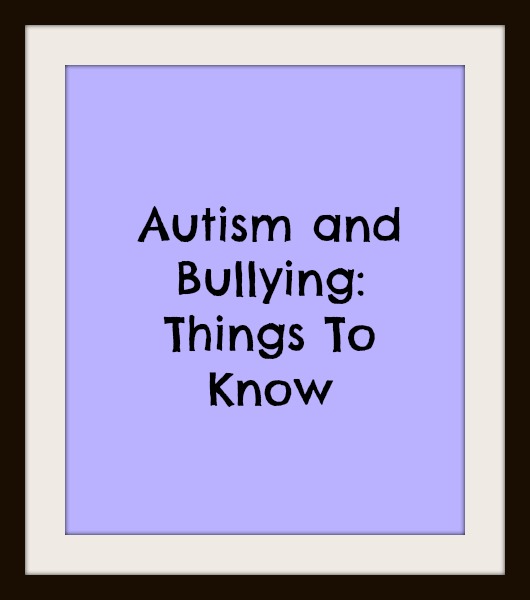Autism and Bullying: Things to Know
Children with autism spectrum disorders (ASD) are at a greater risk for being bullied than their peers without autism. Let's discuss the link between autism and bullying as well as ways to prevent it.

Bullying occurs when there is an imbalance of power between two people and the controlling party displays repeated hostile actions towards the other.
There are certain factors that should be considered when discussing autism and bullying.
Youth with ASD could be at higher risk for being targeted by bullies due to communication impairments. If a child with ASD is not able to express him/herself clearly and confidently, a bully might see this as an opportunity to attack.
Children with ASD may also have atypical interests compared to their peers and this could lead to difficulties in peer interactions. Also, aggressive peers may be encouraged by intense emotional reactions and behaviours displayed by children with ASD.
Children with autism spectrum disorders may also struggle with initiating and maintaining friendships. This could lead to bullying as children with ASD may lack a network of associates who would serve as allies and provide some protection against peer victimisation. Good peer relationships can deter the development of bullying episodes. Peers can also help dissolve bullying episodes as they provide an audience that can make a bully re-think his/her actions.
There are other developmental variables that play a role in autism and bullying. Individual characteristics such as age, gender and severity of ASD symptoms can also affect victimisation experiences.
Researchers have found that boys tend to be victimised more than girls and that victimisation is more intense between the ages of 12-15 (during middle school and the transition to high school).
Moreover, children with more severe ASD symptoms tend to struggle with peer relationships to a larger extent than those with less severe symptoms (high-functioning autism). Both groups, however, continue to face the ongoing struggle with social inclusion as they age.
Victimisation experiences are also largely dependent on the parent-child relationship. This is no surprise as parents play a critical role in their child's social development and understanding. Like poor peer relationships, poor parent-child relationships can place youth at greater risk for victimisation.
The way bullying is processed by those with autism is an other factor to consider. Christina MacNeal from the Art of Autism explains that those with ASD may have a hard time processing a bullying episode. This difficulty in processing what happened and why it happened means that such occurrences are usually past the point of communication, i.e. they don't get reported because the victim struggles with making sense of the situation.
Christina compares this to being in conversation and having a thought on the tip of your tongue but being unable to say it. The memory of it is still there but you just lack the mental clarity and sharpness to be able to reach into your brain and pull it out and say it just how you need to.
Moreover, bullying can be subtle and indirect so children with ASD might not always realise when they are being bullied. On the flip side, they might think they are being bullied when another child is actually trying to play with them.
Bullying is not limited to children with autism - adults with autism also experience bullying. Blair Hill from Connect Autism explains how exactly adults with ASD might be bullied. Blair talks about how his autism (high-functioning) causes him to trust people very much and how he has learned not to be so literal in his perception of other's words and actions.
He further explains how adults with autism might experience bullying through being rejected, cut off and made to feel stupid. Blair says that adults with autism may not necessarily be told "you are stupid", but they will be treated in an unkind way that reflects that vibe. If you get a chance, have a watch of his 4 minute video, and find out about the great work he and his wife Jodi carry out to help people better understand autism.
I'm going to finish up this post with some tips on dealing with autism and bullying:
- Parents should try to talk to their child with autism spectrum disorder about bullying. They may ask their child if someone or something has made them sad, and get him/her to draw or point to pictures to aid the description.
- Parents should also work with teachers at school to prevent further bullying and set up meetings to explain how bullying is affecting their child.
- Something very valuable that parents can give their child to deal with bullying is love and support. Parents should assure the child that they will sort out the situation and provide training and guidance on how to get away from bullying, who to talk to and even showing the difference between play and bullying. This could be demonstrated through role-play and cartoons.
If a child with ASD is bullying others, parents can work to make sure that the child knows what bullying is and find other ways to behave. For instance a parent might show a child how to ask an adult to help him/her join in activities in an effort to avoid bullying behaviour. Parents can again work along with teachers to find the best way to provide support at school. Showing the consequences of bullying as well as rewarding a child for positive behaviours like taking turns can also help to prevent bullying.
Thanks for reading! Any thoughts or useful tips on dealing with autism and bullying? Comment below!
Thanks for reading! If you liked this content, share with a friend:
Recent Articles
-
5 Things to Stop Doing If You Want to Feel More Fulfilled
Feb 21, 26 05:35 PM
Are you unintentionally engaging in behaviours that leave you feeling depleted and empty? Here are 5 things to stop doing if you want to feel more fulfilled. -
5 Subtle Habits That Quietly Transform Your Life Over Time
Jan 25, 26 08:21 PM
Progress towards the things that matter isn't usually loud or dramatic. Here are 5 subtle habits that quietly transform your life over time. -
Inner Work with Marcus Lynn | How to Make Change More Realistic
Jan 19, 26 06:24 PM
In this spotlight interview, therapist Marcus Lynn explains how we can begin to see emotions as information and make change more realistic in our lives.





New! Comments
Have your say about what you just read! Leave me a comment in the box below.